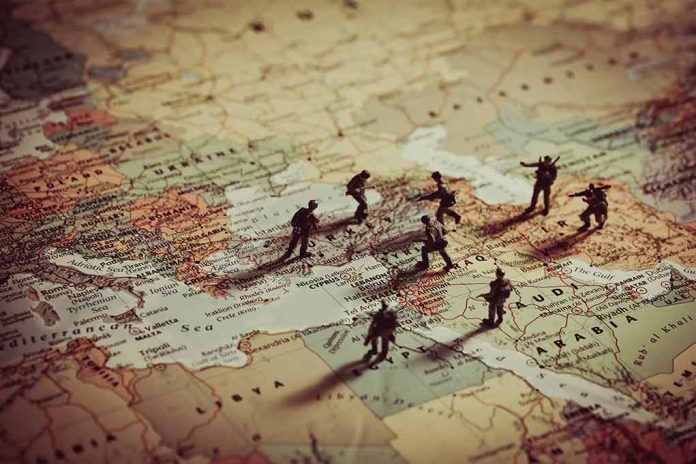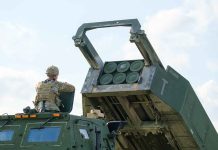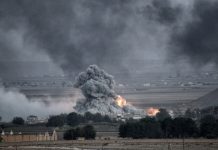
Iran’s brazen missile attack on Israel marks a dramatic escalation, thrusting the Middle East to the brink of all-out war.
At a Glance
- Iran launched approximately 180 ballistic missiles into Israel, escalating tensions
- Israel continues military operations against Hezbollah in Lebanon, with airstrikes killing 55
- Hezbollah has violated UN resolutions, deploying forces and firing weapons from restricted zones
- The United States is urged to increase diplomatic efforts to prevent a wider regional conflict
- Iran faces a dilemma: not retaliating risks alienating allies, while retaliation could spark a wider war
Iran’s Audacious Attack on Israel
In a shocking display of aggression, Iran launched a barrage of approximately 180 ballistic missiles into Israel, marking a severe escalation in the already tense Middle East conflict. This unprecedented attack forced millions of Israelis to seek shelter as air raid sirens blared across the country. While many missiles were intercepted by Israel’s advanced defense systems, some managed to land in central and southern Israel, as well as the occupied West Bank.
Iran’s audacious move comes as a purported retaliation for the assassinations of Hamas leader Ismail Haniyeh and Hezbollah leader Hassan Nasrallah. However, this claim appears to be a thinly veiled excuse for Iran to flex its military muscle and challenge Israel’s regional dominance. The attack demonstrates Iran’s willingness to escalate tensions and potentially drag the entire region into a wider conflict.
Israel’s Swift Response and U.S. Support
Israel, true to its reputation as a formidable military power, wasted no time in responding to Iran’s provocation. The Israeli Defense Forces (IDF) continued their military operations against Hezbollah in Lebanon, conducting airstrikes that resulted in 55 deaths and over 150 injuries. These strikes targeted strategic Hezbollah locations, effectively degrading the terrorist organization’s capabilities.
“There is nowhere in the Middle East Israel cannot reach.” – Prime Minister Benjamin Netanyahu
Netanyahu’s statement serves as a stark warning to Iran and its proxies, underscoring Israel’s determination to defend itself against any and all threats. The United States, demonstrating its unwavering support for its closest ally in the region, provided crucial assistance to Israel. U.S. naval destroyers played a pivotal role in intercepting Iranian missiles, while President Biden reaffirmed America’s commitment to Israel’s security.
Hezbollah’s Growing Threat and UN Violations
The escalating conflict between Israel and Hezbollah in southern Lebanon has reached a critical point. Since October 7, 2023, over 4,400 rocket and missile attacks have occurred between the two sides. Hezbollah, emboldened by Iranian support, has brazenly violated UN Security Council Resolution 1701 by deploying forces and firing weapons from the zone between the Blue Line and the Litani River.
Hezbollah’s arsenal, estimated to include between 120,000 to 200,000 rockets and missiles, poses a significant threat to Israel’s security. This terrorist organization has improved its military capabilities since 2006, acquiring advanced unmanned aerial systems and other sophisticated weaponry. The international community’s failure to hold Hezbollah accountable for its UN violations has only emboldened the group, increasing the likelihood of a full-scale conflict.
Iran’s Dilemma and Regional Implications
Iran now finds itself in a precarious position. The death of Hezbollah leader Hassan Nasrallah in an Israeli airstrike has deprived Tehran of a key ally in the region. This loss presents Iran with a challenging dilemma: failing to retaliate could alienate its remaining regional militias, while escalating the conflict risks sparking a wider war that Iran may not be prepared to fight.
Despite Khamenei’s fiery rhetoric, Iran’s actions suggest a reluctance to engage in direct conflict with Israel. The Iranian Foreign Ministry’s emphasis on peace and stability, coupled with warnings against threats to national security, indicates a desire to avoid further escalation. This hesitancy is likely influenced by Iran’s domestic challenges and the potential economic consequences of a prolonged conflict.
The Need for Decisive Action
As tensions continue to rise, the United States must take a more assertive role in preventing a wider Middle Eastern war. Increased diplomatic efforts are crucial to de-escalating the situation and containing Iran’s malign influence in the region. However, diplomacy alone may not be sufficient. The U.S. should consider bolstering its military presence in the area to deter further Iranian aggression and support its allies.
Israel, for its part, must continue to defend itself vigorously against threats from Iran and its proxies. The IDF’s ongoing operations against Hezbollah in Lebanon are a necessary step in dismantling the terrorist organization’s military capabilities. However, Israel must also be prepared for the possibility of a wider conflict, including potential attacks from Iranian-backed militias in Syria and Iraq.
The international community, particularly the United Nations, must hold Iran and Hezbollah accountable for their violations of international law and UN resolutions. Failure to do so will only embolden these bad actors and increase the likelihood of a catastrophic regional war. The stakes are high, and the time for decisive action is now.






















